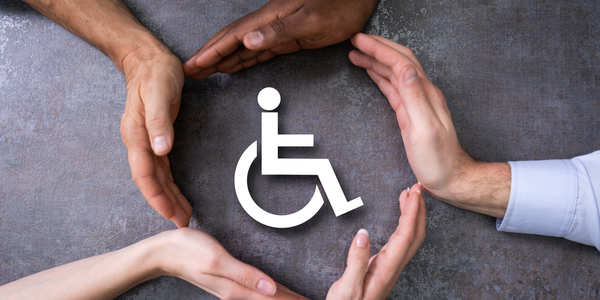Disabled and Under 65? Get the Care You Need with Medicare

What happens to your insurance coverage when you’re disabled and can’t work? Its a frequently asked question regarding medicare and disability under 65. Most people think of Medicare coverage as strictly for seniors, but if you’re disabled and under 65, you may also qualify. Nearly 15% of current Medicare recipients are under the age of 65. Today we’re discussing some of the most common questions people have about qualifying for Medicare with a disability.
How do I qualify for Social Security disability benefits?
If you’re disabled, under 65 and want Medicare coverage, you’ll have to be approved for and start receiving Social Security Disability Benefits (SSDI). The first requirement for SSDI is that your condition is on the approved list of impairments, sometimes referred to as the “Blue Book.” Although there are 14 categories of mental and physical impairments, and many diseases and disorders within each category, not every disability is covered.
The second requirement is that you’ve worked long enough to pay into Social Security. Typically you’ll need at least ten years of employment, although exceptions are made if your condition is considered severe enough to limit your ability to work.
This somewhat strict definition of “disability” leads to the denial of many initial applications for SSDI. Nationwide, only 23% of initial applications are approved for benefits. There is an appeals process, but only about half of applicants pursue reconsideration. But if your first application is denied, you really should start the appeals process right away. Although your case may take several months, or even a few years, to be heard, appealing increases the approval rate by nearly 40%.
How do I apply for Medicare once I’ve been approved for SSDI?
There’s usually a five-month waiting period to start receiving SSDI benefits once you’ve been approved. After your waiting period is over, you need to collect benefits for 24 months before Medicare coverage is available. There are some exceptions to the 24-month rule for certain conditions like ALS (Lou Gehrig’s Disease) or End-Stage Renal Disease (ESRD). During your 25th month of benefits, you should automatically receive a Medicare card in the mail. If you don’t receive yours, contact your local Social Security office.
Some disabled individuals may also receive Supplemental Security Insurance benefits (SSI) in addition to SSDI. With such similar names, these two are often confused for one another. Earning SSI doesn’t qualify you for Medicare, but in certain cases, you may be automatically eligible for Medicaid.
Will my coverage be the same as other Medicare beneficiaries?
The benefits package for Parts A and B (Original Medicare) is the same whether you’re a senior on Medicare or if you’ve qualified through a disability. The health services you receive don’t have to be related to your disability, and there are no diseases or conditions that preclude you from receiving coverage. You can also choose to purchase an Advantage Plan (Part C) or a prescription drug plan (Part D).
Medicare and Disability Under 65: Can I ever lose my Medicare coverage?
If you’re disabled and under 65, you could lose Medicare coverage in two different circumstances. (If you are eligible for coverage as a senior, you’ll never lose it.)
- Improved condition: Certain conditions, once improved, can cause your Medicare coverage to end. For example, if you’ve been on dialysis, you’ll lose coverage 12 months after your last month of treatment.
- Returning to work: Confusion around working and disability is common. But getting a job doesn’t automatically disqualify you from receiving benefits! If you do start working while on disability, you’ll enter a nine-month trial period to assess your ability to work. If you continue working after this time, you’ll be granted 93 months (seven and half years) of premium-free Medicare coverage of Part A and B. After this time, you can choose to purchase Medicare coverage if you’re still working and disabled.
What if I have more questions about Medicare and Disability Eligibility if I’m under 65?
Although getting Medicare once you’ve started receiving SSDI benefits is fairly straightforward, starting the process can be more difficult. If you have questions about your eligibility, contact your agent today or call 877.255.6273 for more information.
image credit: shutterstock/Andrey_Popov

